Aude Mulliez is a woman for the new millennium. At 33, she has launched her own green social enterprise, become a continental ambassador for female empowerment and impacted lives in half a dozen countries – including her own. She’s tackled some of the thorniest issues of our time – migration, environmental degradation, extreme poverty, and violence against women – head-on, with creativity and passion. But for all of her professionalism and badassedness, she’s had to learn another lesson as well — one of inner self defense.
From trash-pickers in Costa Rica and Peru to earthquake victims in Haiti, to survivors of domestic violence and rape and female genital cutting, her approach has been empowerment and healing, on all levels. She took some time recently from her busy schedule to share some stories and reflections.
Esperanza Project: I am intrigued by the way you have blended your passions for the environment and Latin America and human rights with your concern for women’s empowerment. I’d like to know more about how that came about for you. Starting at the beginning: It seems you have spent a little time everywhere – India, Senegal, Peru, Ecuador, Haiti, the United States. Where are you from originally, and what was it that inspired you to work in international development and social change? In particular, this being The Esperanza Project, what inspired your concern about the environment?
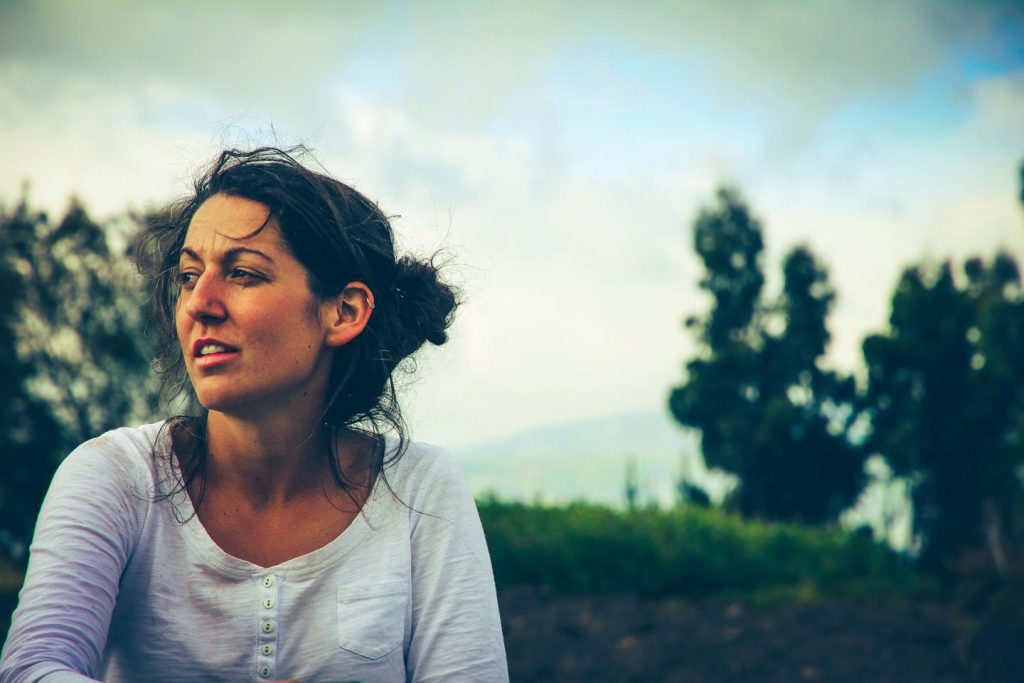
Aude: My parents are entrepreneurs who moved to the U.S. from France when they were 22. I was born in the U.S., in Atlanta, and once their first business failed (a yarn factory in the humid hot south of the U.S.!), we moved back to France. When I was 10, the family moved back to the U.S. and my parents tried again — they built a successful French bakery.
I grew up bicultural and had the privilege of financial security as well as being raised in an environment with immigrants from many parts of the world. At my school, the head of the primary school left this wealthy establishment to start a community school for refugees in our city. Volunteering there, I was hit with the differences between being a migrant, a migrant from a More Economically Developed Country, and that of a refugee from a Lesser Economically Developed Country. Later, my English teacher in high school, Ms. Shanta, was from India, and through her generosity and through the organization she founded, I traveled by myself to the Tamilnadu region in India when I was 19. There, I met children of women whose relationships with their husbands led them to commit suicide by lighting themselves on fire, what is said to be “proper” in order to maintain one’s honor and that of one’s family.
Through these experiences, and through the dedication of both of these inspired humans, I had the privilege to learn firsthand and young how unfair and hard the world is, particularly for marginalized peoples; how very different our experiences and “luck” can be, and how to listen, observe and ask questions that encourage people to keep talking. I learned and I became inspired by those humans and found solace and peace thanks to Mother Earth.
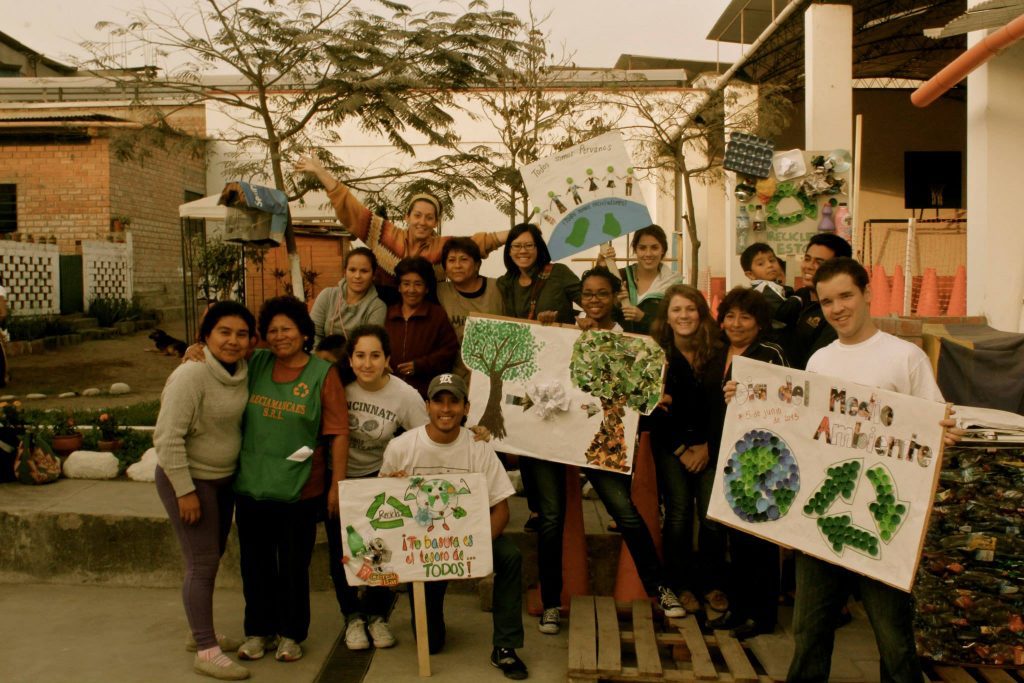
Esperanza Project: You are the cofounder of EkoJunto de Costa Rica, which has developed a low-cost building material using upcycled plastic, employing a group of women living in a slum on the edge of a trash dump. Can you clarify and tell me the story about how that project came to be?
Aude: Through an upcycling process, a fancy word for transforming something that wasn’t great and doesn’t have a long-term function into something with a lot of potential and that lasts a long time, we provide building material made out of used plastics (post-consumer and post-industrial).
While I was working for an Ashoka fellow (social entrepreneur) in Lima, Peru, a woman named Mili Castro changed… everything. She, with the help and support of many others, created a communal space which housed women who were escaping domestic violence and children without secure homes, where older people were learning Tai Chi and others learning trades, and all of this was supported by wastepicking, more commonly known as “recycling.”
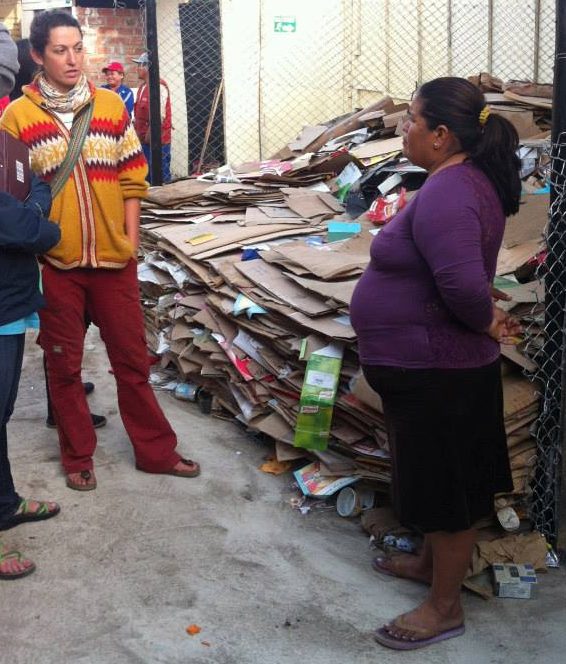
Seeing this, my partner and I were inspired to create more markets for the 200,000+ families in Lima surviving from “recycling,” and we had our eyes on plastic bags — no one was buying/using/recycling the millions of plastic bags that were layering the streets. Bertrand Debar, my partner, learned from a technology made by Nigerian men who were mixing plastic bags and sand to make bricks to pave roads. Our first brick was made just like that. We then found a group in Colombia who had developed a technology to transform particular non-single use plastics into bricks to make homes.
Our goal was always to support the mostly women and men who survive economically by bringing together an amount of valuable waste and then selling it. When we arrived in Costa Rica, we realized the “recycling” industry here was not as developed as we had thought. Again, I met wonderful and inspired women living in an urban settlement near one of Costa Rica’s largest dumps who wanted to start a waste-picking group as an income-generating project, and we went from there. Most of the residents of the slum are undocumented and therefore are not given access to many income-generating opportunities.
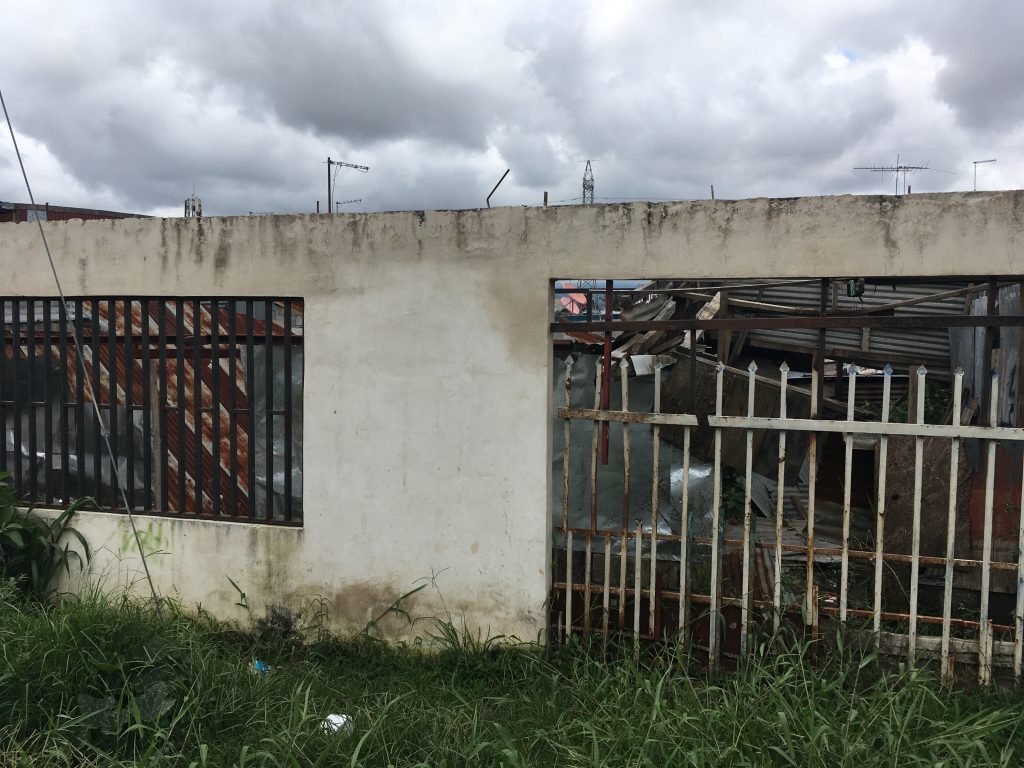
Before… 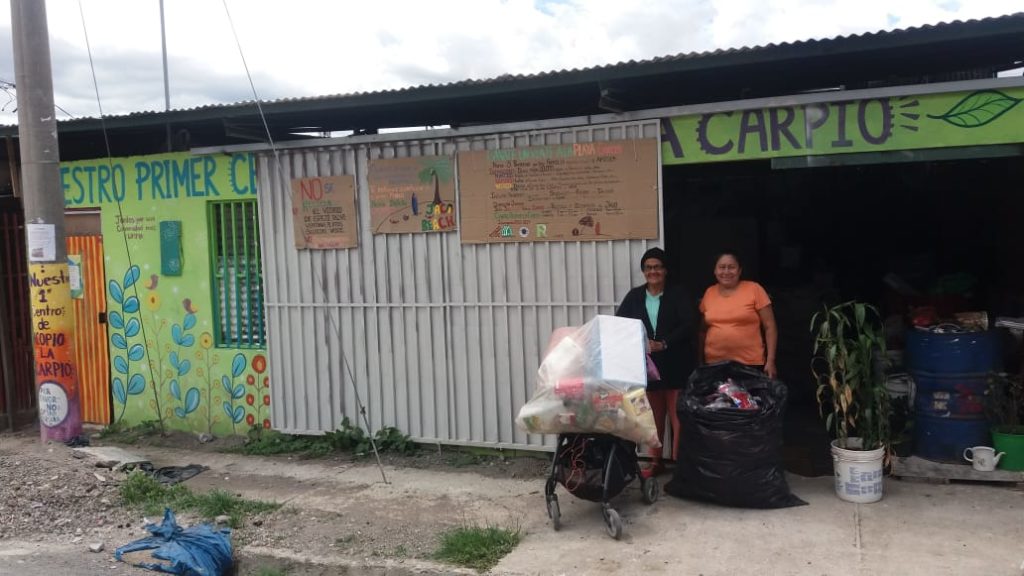
…and after
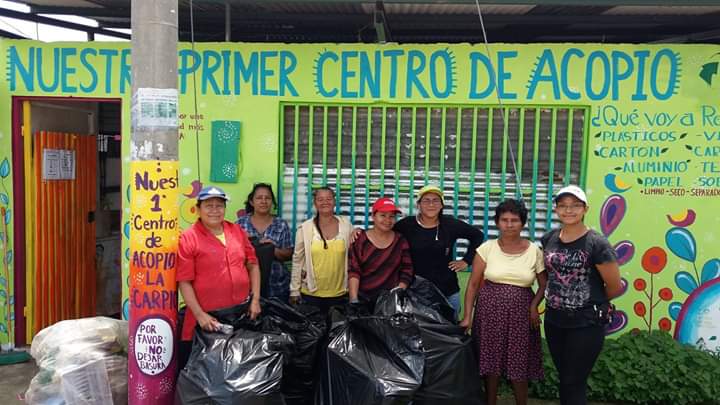
The women took over a “bunker”, a place two gangs were fighting over in order to have a space to sell drugs from.The women did not tell me the history of the place until I asked, when my intuition could not stop me from ignoring the men who would walk by staring at us as we took down the old structure. They knew the men wouldn’t shoot the place up if there was a white woman standing there. And they were right. We’ve had no problems and later, both gangs came by to tell us that if we ever had any problems, they would “help us”. The women knew that they were creating positive change and that it is something that their community supports.
As for the construction end, it took us two years to get the materials approved by the Colegio Federado de Ingenieros (Federated College of Engineers, the body charged with authorizing new construction materials). Up to that point, we thought we had already fought our biggest battles!
Esperanza Project: What has been the response to this business? Has it been able to gain traction in the housing market in a significant way?
Aude: You know how you see videos on Facebook or YouTube and think, “This is amazing! Why isn’t this technology everywhere?!”? Well, it’s because it’s hard…! A lot of people think it’s a great concept. People want to tell their friends, students, coworkers, government officials, architects, NGOs about it and they are glad and relieved that it is available. But when it comes to the time to invest money, especially for the populations that we wished to target who have saved all their hardworking money to build a home, they’re going to go with something that’s a sure thing. Even though we think our technology is a sure thing, I understand why people are going to invest in cement. I think we’ve gained traction in inspiring people that there is another way and that plastic should be used to build things that are meant to last forever and not be “trashed”. Bertrand, my partner, thinks that that is not enough. I think it makes all the struggling worth it.
Esperanza Project: How have the women’s’ lives changed in this process – and how has it changed you?
Aude: You would have to ask them… For me, it’s reaffirmed the same lesson I always learn — never make empty promises. In the Western context, we like to make “projections” in our work and talk about the future and our aspirations. Sure, dreaming is a good thing and thinking about what we want things to become is productive. But when it comes to people’s lives and survival, I keep learning that I had better focus on the present and make sure that when we’re talking about our aspirations, it’s anchored in the present and in realities only those who live and work in them know and are experts on.
Innovation, social innovation, is truly the future and clearly was the past, and it’s also already here and we need to invest in it, most importantly with human capital and financially.
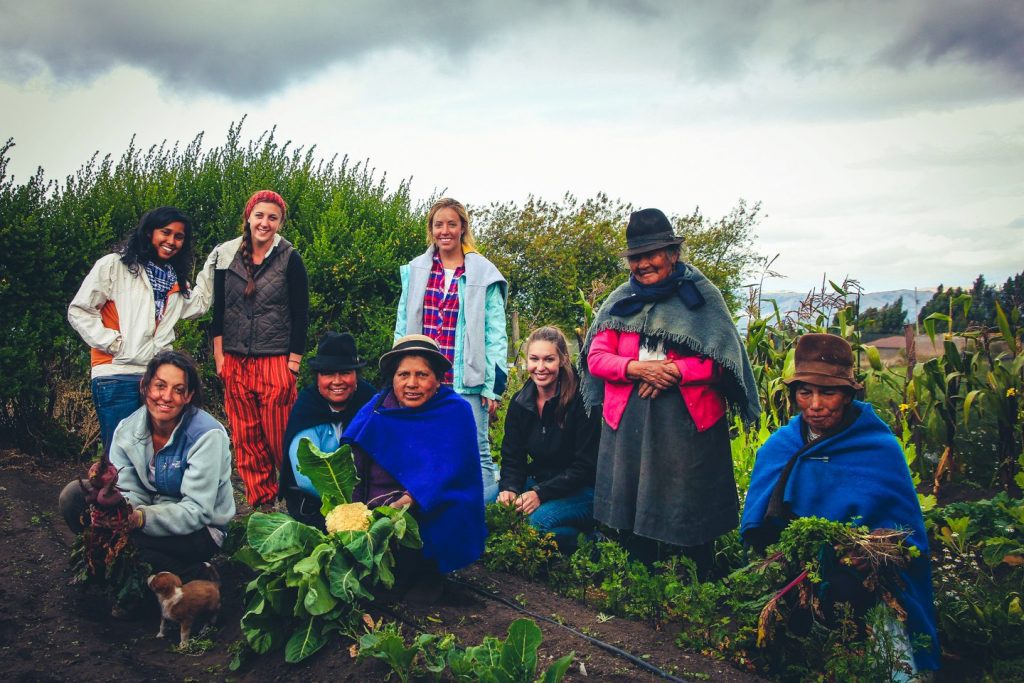
Esperanza Project: Women’s empowerment has been a top priority of yours, which is evident in your work with Empowerment through Self Defense, as well as with EkoJunto. At what point were you inspired to involve yourself in what you refer to as the “women’s solidarity movement,” and why?
Aude: Everywhere I have had the privilege to work and live, I have been surrounded by inspiring women working together to achieve positive change. I remember walking into urban settlements in Lima and out of nowhere, elderly women would pop their head through the window and tell me not to go straight but to turn left. Just that. Not a hi or what is a white woman like yourself doing here. Just a ‘better go right’, taking a second to potentially change the course of my life, probably not making a big difference in their own. Those everyday demonstrations of solidarity, I believe, have a huge impact on what we do and how we carry ourselves.
In Senegal, I wrote reports for an organization participating in social change around Female Genital Cutting and Child Forced Marriage. I would spend time in the kitchens, where the women would laugh at me, all in good fun. I remember feeling useless. Then one woman handed me an onion and taught me how to cut it without using a cutting board. I am ever so grateful to that woman — and after that, everything changed. I could “do something” in the kitchen, and therefore the women would be way more likely to engage with me.
I learned through all these experiences, thanks to all of these women, the importance of just showing up for each other. A smile on the street, a head tilt of approval, looking supportively into someone’s eyes. As a Western white woman working in areas and realities that I was not born and raised in, and with colonialism and imperialism ever so present, it’s huge to be able to realize who we are and what we symbolize in each context. For me to participate in the solidarity movement, a lot of the time I show up, ask if and how I can be of support, shut up and listen and in the cases when someone is perpetrating a micro-aggression or participating or supporting violence in any form, I push myself to say something, something as simple as “I don’t think that’s ok/right/acceptable”.
Esperanza Project: Speak to me a bit about Empowerment Through Self Defense. Why is self-defense so important for women in Latin America? What kinds of changes have you seen come about for the women who participate? Can you give a couple of examples?
Aude: Empowerment Through Self Defense is important in all parts of the world. Violence perpetrated against communities made marginalized by patriarchal structures is enragingly everywhere. Specific to Latin America, according to UNDP and UN Women, “…the region registers the highest rates of violence against women outside the intimate partner and the second highest within the couple [in the world], according to data from the Observatory on Gender Equality in Latin America and the Caribbean”.
I admire the use of the word “Femicide” in Latin America (amongst many things). In English, there is no direct word to speak of the killing of a woman because of her gender. It’s not put in those terms. And it’s still, “a woman was beaten because of dirty socks” — that was a headline today… Not “An entitled white man, after many years of psychological, physical and emotional abuse, was allowed to kill #sayhername”.
I write ‘allowed’ because the killing of one’s familiars does not happen in a vacuum. People are aware of what is happening. Our societies, our peers and those in authority, make it almost impossible for concerned people to do anything. We are not taught any tools to deal with these realities because the truth is, there are men with power who truly believe this is how their power will stay the way it is. And the example above happened in the United States.
In this region, I had been working in economic development, social change, against Human Trafficking, with governmental organizations, with non-governmental organizations, with international organizations and local organizations and I realized that nothing I was doing was having a direct impact, on myself or on anyone I met. Thankfully, a Costa Rican Trans Rights Activist, in a Gender and Security conference, finished the conference by saying: “And this is why we need more people trained in Feminist Self Defense”. I took her advice and searched for an organization that would train me in that methodology, now called “Empowerment Self Defense” by this community.

In Costa Rica, the majority of men who impregnate teenage girls are over the age of 25. Oxfam just came out with a study showing that 14- to 25-year-old Latin American boys and men do not understand “No” as “No,” and other distressing facts. When a father impregnated his 13-year-old daughter, the public discussion was about whether Costa Rican society could “deal” with an abortion as a result. An abortion was not performed and the girl took her own life months after birth. I am recounting this information because it was in the news. The first agreement in an Empowerment Self Defense (ESD) class is confidentiality.
These are the realities in what is deemed one of the “Happiest and Greenest countries in the world”. This is why I and the community of ESD instructors “do what we do”; because this is the reality. I have supported many individuals and mentors who have worked tirelessly to fight the systems that perpetrate and allow this violence to continue to occur. And I have gained the knowledge that there are still too many women who lose as they wait for “justice” and “social change” to reach the past, present and future perpetrators. The ESD methodology is proven to work, academically and through testimonial, after every class.
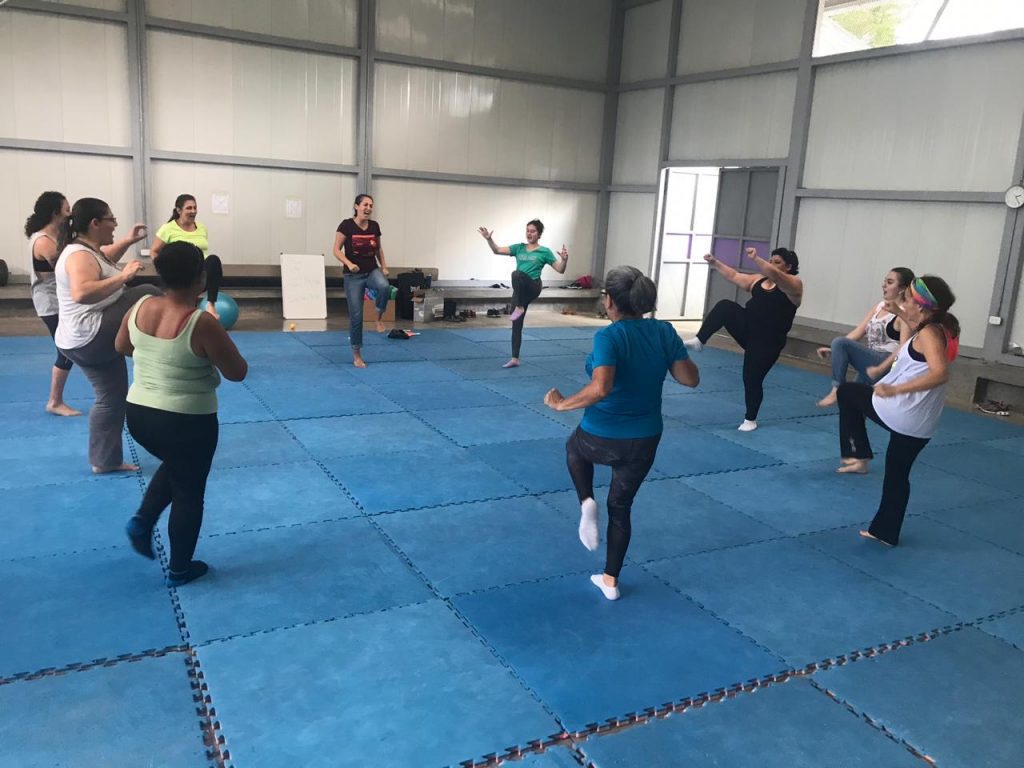
Thanks to the hard work of many women and individuals of different gender identities in Latin America, there is less outward acceptance of Gender Based Violence (of course it still occurs at flagrant rates and this is not the case everywhere). Because of this work and determination, I am convinced that the tools we offer are essential in the further realization that women, girls, boys and individuals of other gender identities have options in the ways to act in response to, or in order to prevent, micro-aggressions and violence.
Not speaking of any one case in particular, when a person who had little self confidence in their ability to protect themselves hits a pad, their eyes change. It’s like a light shines through, and their eyes go wide with the realization that they can and could defend themselves. The light shortly gets extinguished once their brain takes over, perpetuating the constant barrage of misinformation we receive by society about how this will make the perpetrator more aggressive, or that they won’t hit hard or good enough, because we aren’t strong or capable.
ESD practitioners work a lot (if not primarily) on self-worth, self-care, trusting our intuition, finding support, giving support, assertive and effective communication, and how to identify, establish and maintain our boundaries and limits. It is trauma-informed and focused on healing, and is a methodology that was created by women martial artists and experts and supported by academics, taking into consideration the social and cultural factors that engulf the violence perpetrated against marginalized communities.
Esperanza Project: How does the empowerment of women relate to your other major passion, which is care for the planet?
Aude: The planet/our world is clearly missing 50%+ of its population’s input on what knowledge and experiences should be valued and woven into our way of being. Yes, the structures need to be overhauled and I believe that one way I can help do that, to care for this wonderful and only Earth and its inhabitants (plants and animals alike), is participate in promoting, to those who have asked for it and in my case, primarily to women, their ability to trust themselves, their ability to support others and their ability to ask for support. Also the acceptance to care about being liked only by people who are showing her and them respect.
Esperanza Project: You saw the aftermath of the 2010 earthquake in Haiti that killed more than 300,000, and were involved in a microcredit project to empower the survivors. Can you talk to me about the secondary trauma – feelings that might have lingered from having worked in a disaster zone? Have you developed your own inner self-defense strategies for coping with that kind of work, and is that something you can share?
I traveled to Haiti thanks to a woman from the Haitian diaspora in the U.S. who wanted to develop a microcredit project. After a week, we decided to change routes; the interest rates were causing more trauma to the women who were targeted. Because of this and because I was privileged to go to rural communities where I was fortunate to observe, we developed a platform for the sharing of best practices that communities were already experts in.
Feelings that have lingered: I dislike speaking of other people’s traumas because it is theirs, not mine to share. In Haiti, it was another time I saw the lack of hope in people’s eyes. It’s a hard reality to process. I think that’s why I moved to working on environmental concerns, and then I still chose to meet women who worked in those areas and who were struggling in their own ways.
Inner self defense strategies are a real struggle for me and I’m sure for many of your readers. Six years ago, I burnt out, quitting my work in Lima, after having a miscarriage from an unplanned pregnancy. My partner and I moved to Costa Rica — although I thought it was an island, and I thought my career was finished with “Costa Rica” on my CV. But arriving here was the first time I heard about Self Care. “Caring” was meant to push me to work more hours, to accept lower pay, to accept working conditions that were not conducive to mental health. I know I’m not the first or thousandth person who has spoken about this. And still today I think, if I truly “cared” I would be doing more.
This changed for me once a friend told me that that line of thinking was taking the power away from the people I worked with; it was not empowering them that “my” care and “my” work was what would ignite… something. That’s how I try to look at it now. And clearly without that friend being completely honest with me and me with her, she would not have said it and I would not have heard her. So my inner self defense strategy is being honest with people and allowing them to be honest back and making those people your friends. Hope that helps!
Esperanza Project: Along the same lines, you also worked on the frontlines of the migration crisis at the Costa Rican border with Panama for an agency fighting Human Trafficking. Also in your work with traumatized women through EDS, you have to be the strong one. Does that take a toll? What words of wisdom and/or advice might you have for other women whose work brings them into this type of situation?
Aude: In my Master’s Program, we practiced techniques of mirroring the person who was telling us their story, thanking them for sharing, being compassionate; while on the inside, we’re trying not to take it in physically by repeating to ourselves the questions ‘how do I feel, how do I feel’. This creates a distance in our brains and is specifically necessary for people who internalize others’ pain. Our brain will say “Hey, what if that had happened to us? How would you feel?” and that in turn makes you unable to continue to be compassionate to other people who want to share their story. It’s important not to make it yours. Also, don’t give advice if they’re not asking for it.
There are a lot of ways to process and express trauma and I’m sure someone else can share more about that. I’m privileged and grateful to have known many wonderful women in the same line of work and we try to create spaces where we can talk about it and others where we focus on having fun and being ridiculous. Channeling it into something positive is also important.
It takes a toll. Most people contact us inquiring about our houses and construction material after they are touched by a news story about environmental devastation. I get the most work teaching ESD when a man kills a woman, girl or individual of non-conforming gender identity and its publicized. That also takes its toll. But then I go teach another class or reach out to more women doing incredible work and see if we can collaborate, and I focus on that energy that comes from individuals coming together with the goal to share tools so that we may live lives that we own. That we also get to decide how things happen to us. I truly hope that ESD practitioners and innovators, that we are participating in joining together in an inspiring way.
Aude Mulliez is a community organizer and facilitator of Empowerment Through Self Defense throughout Latin America. Together with her husband she now runs a company in Costa Rica that creates access to building blocks made of recycled plastic.
alternative housing Costa Rica ecobricks Empowerment Through Self Defense recycling Self Defense social entrepreneurism Violence against women